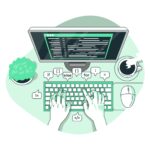Python has surged in popularity, becoming a favorite among both novice and experienced programmers. Its simplicity and power have made it essential in many fields, from web development to data science. For those looking to enhance their Python skills, this guide offers practical hacks and tips, cutting through complexities and accelerating your learning journey.
The Allure of Python Programming
Python’s appeal lies in its readability and efficiency. The language’s design emphasizes code readability with a syntax that allows programmers to express concepts in fewer lines of code than possible in languages like C++ or Java.
Python Programming Hacks for Efficient Coding
- Embrace Pythonic Code: Writing ‘Pythonic’ code means following Python’s design philosophy, which emphasizes readability and simplicity.
- Leverage List Comprehensions: They offer a concise way to create lists, combining loops and conditional tests into a single line.
- Utilize Python Libraries: Libraries like NumPy for scientific computing and Pandas for data manipulation extend Python’s functionality significantly.
- Explore Frameworks: Frameworks like Django and Flask can simplify web development processes.
Accelerating Python Learning: Practical Tips
- Interactive Learning with Python Shells: Tools like IPython and Jupyter Notebook provide an interactive coding environment, ideal for experimentation and learning.
- Building Small Projects: Practical application in small, personal projects can reinforce concepts and boost confidence.
- Joining Python Communities: Communities like Stack Overflow or GitHub offer valuable resources, advice, and collaboration opportunities.
- Regular Practice: Consistency is key in programming. Regular coding sessions help in retaining and understanding concepts more deeply.
Python for Data Science and Machine Learning
Python’s role in data science and machine learning is monumental. Libraries like TensorFlow, Keras, and Scikit-learn have made Python the go-to language for these fields. Understanding these libraries can open up numerous opportunities in these rapidly growing areas.
Debugging and Testing in Python
Effective debugging and testing are crucial for any programmer. Python’s simplicity comes to the rescue here, with easy-to-use debugging tools like pdb and testing frameworks like PyTest. Mastering these tools can greatly enhance code quality and reliability.
Optimizing Python Code for Performance
- Understanding Algorithm Complexity: Optimizing algorithms and understanding their time and space complexity can significantly improve performance.
- Profiling Python Code: Profiling tools help identify bottlenecks in the code where optimizations are most needed.
- Using Built-in Functions and Libraries: Python’s built-in functions are optimized and compiled in C, offering faster alternatives to manually written code.
Best Practices for Python Code Style
Adhering to Python’s PEP 8 style guide ensures that code is not only functional but also clean and consistent. This practice is especially important in collaborative projects to maintain code readability and quality.
Advanced Python Programming Concepts
As proficiency grows, exploring advanced concepts like decorators, context managers, and metaclasses can offer deeper insights into Python’s capabilities and inner workings.
Staying Current in the Python Ecosystem
The Python ecosystem is continually evolving. Keeping abreast of the latest developments, version updates, and best practices is crucial for staying relevant in the field.
Python in Web Development
Python’s utility in web development, particularly through the Django and Flask frameworks, is noteworthy. These frameworks simplify tasks like database integration, URL routing, and session management, making web development more accessible and efficient.
Python’s Role in Automation and Scripting
Python excels in automation and scripting tasks. Its readability and rich ecosystem make it ideal for writing scripts to automate mundane tasks, data scraping, and system automation.
Python and Open Source Contribution
Contributing to open-source Python projects can be a significant learning experience. It offers practical experience, peer review, and insight into large-scale project development.
FAQs on Learning Python Programming
- Q: Is Python a good language for beginners? A: Yes, its straightforward syntax and community support make it ideal for beginners.
- Q: How long does it take to learn Python? A: The timeline varies based on prior experience and learning pace, but with dedication, the basics can be learned in a few weeks.
- Q: Can Python be used for mobile app development? A: While not as common as other languages, Python can be used for mobile app development, particularly with frameworks like Kivy.
Conclusion: Python as a Gateway to Coding Proficiency
Python programming is not just about learning a language; it’s about opening doors to various technological realms. Whether your interest lies in web development, data science, machine learning, or simple script automation, Python provides a solid, versatile foundation for your coding journey.
Final Thoughts
In conclusion, Python stands out as an accessible, powerful tool in the programming world. Its simplicity, coupled with its wide range of applications, makes it an invaluable skill for any aspiring programmer or tech enthusiast.



